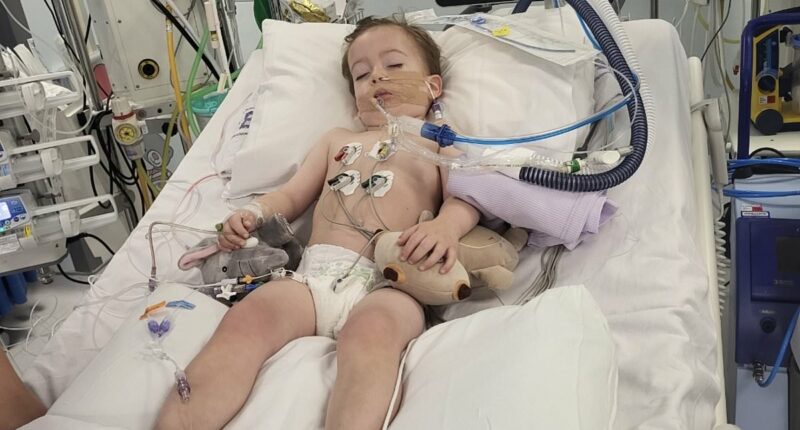Share this @internewscast.com
Elise Bayley thought little of it when her toddler broke out in a familiar red rash.
Two-year-old Carter had caught chickenpox from his older brother, just as countless children do every year.
‘He was acting like his usual self,’ says Elise, 34. ‘He had the rash, but otherwise he was fine and seemed to handle it well. It took about two weeks for him to recover, and we thought that was the end of it.’
But six months later, the mother-of-two’s world turned upside down.
One evening, as she bathed her son, she noticed one side of his tiny face had drooped.
‘My heart sank. I had seen enough awareness campaigns to understand what was occurring, but I didn’t want to accept that it could happen to children – to my child.’
Elise immediately called 111. ‘We explained our suspicion that Carter was experiencing a stroke – but they seemed skeptical. They said he was too young.’
‘Even when the paramedics arrived they didn’t know what was going on. It was terrifying – something a parent should never have to go through.’

Carter was just two when he suffered a life-threatening stroke triggered by the chickenpox virus

Two-year-old Carter had caught chickenpox from his older brother, just as countless children do every year
Guidelines state that all suspected stroke patients should have a brain scan within an hour of arriving at A&E.
But the Bayleys, from Berkshire, waited more than two hours before doctors confirmed the worst: Carter had suffered a middle cerebral artery stroke.
A blood clot had blocked one of the brain’s largest arteries, cutting off vital oxygen.
‘He went from being a kid who was exceeding in everything to being unable to walk, talk, swallow or even sit up,’ says Elise.
‘It was devastating to see him go from a healthy young boy with a bright future to being connected to machines that were essentially keeping him alive.’
At just two years old, Carter was placed in a medically induced coma for almost a week to relieve swelling on his brain.
Surgeons even warned they might need to remove part of his skull – a procedure known as a craniectomy – though, mercifully, it was avoided.
He spent more than two months at Southampton Hospital, slowly relearning basic functions.

Carter, pictured with his older brother and parents, caught chickenpox shortly after his older brother – despite Elise trying to keep them separate
Doctors eventually told Elise the most likely cause was the varicella-zoster virus – chickenpox.
The infection, often dismissed as a mild childhood illness, had damaged Carter’s arteries, ultimately leading to the stroke.
In approximately one to two out of every 1,000 chickenpox cases, the virus can reach the brain and cause encephalitis – a serious swelling that can have dire consequences.
In other rare cases, like Carter’s, varicella-zoster attacks the blood vessels themselves.
Even after the rash disappears, the virus remains in the body. It stays dormant in the nervous system, triggering slow inflammation in the arteries – a condition known as post-varicella arteriopathy.
Over weeks or months this makes vessel walls swell and narrow, leaving them prone to clots.
Elise was told that ‘following the virus, the most insignificant of colds could have pushed his body over the edge, triggering a stroke.’
In other words, Carter’s arteries had already been weakened, and even the immune response to something as ordinary as a runny nose was enough to cause a clot.

Chickenpox is caused by a virus called varicella-zoster, and it is normally a mild and relatively harmless illness that causes a tell-tale rash
Carter’s ordeal comes as the NHS prepares to roll out a new jab against chickenpox – the biggest expansion of the childhood vaccination programme in more than a decade.
Children who catch the virus face a four-fold increase in stroke risk for up to six months afterwards, a statistic experts say has been largely overlooked.
While stroke in children is rare, doctors believe vaccination could consign chickenpox, and its complications, to history.
Professor Helen Bedford, of University College London, said: ‘Whilst it is very uncommon, it does happen. A small risk is still a risk. If you’re vaccinated and you’re immune, then this risk is eliminated.’
The jab, which costs around £150 privately, will now be free on the NHS. Until now it was only offered to those living with, or caring for, people at high risk such as cancer patients.
Every year in England, hundreds of babies are hospitalised and, on average, 25 people die from the illness.
Ministers hope that by offering the jab free on the NHS, around half a million children will be protected every year.
The varicella vaccine is already routine in the US – where cases have fallen by 97 per cent – as well as Canada, Germany and Australia.

Each infected person is thought to pass the virus on to 10 other people, making it more contagious than the common cold and flu, which each infected person gives to two others
In the UK, however, health leaders had hesitated, fearing it might trigger a rise in shingles.
Adults exposed to chickenpox get a natural ‘top-up’ of immunity, helping stop the dormant virus reactivating later in life. Without that boost, shingles cases could climb.
‘Chickenpox is quite a complicated virus,’ says Prof Bedford. ‘It can become dormant in your body and then reactivate later as shingles.
‘So as long as it’s circulating, it boosts people’s immunity and protects against shingles. But now we have a shingles vaccine for older people – significantly lowering the risk of complications later in life.’
The chickenpox jab is made from a live but weakened strain of the virus, and is not recommended for those with severely compromised immune systems.
It does not guarantee lifelong immunity, but greatly reduces the risk of catching chickenpox and almost eliminates the chance of severe complications.
From January, the vaccine will be given in two doses – at 12 months and 18 months – protecting more than half a million children every year.
Health officials are also considering a catch-up programme for millions more under-fives, although it is not expected to be extended to older children.
Prof Bedford added: ‘This vaccine is not new. It has been used for a long time, in almost 50 countries, and a great deal of care was taken over the decision to introduce it.’
Juliet Bouverie, CEO of Stroke Association, added: ‘Around 400 children have a stroke in the UK every year and more than half of those will be left with a life changing disability which could affect their speech movement or vision.
‘One cause of childhood stroke is infections including chickenpox with an increased risk of stroke for around six months after the initial infection.’
Now four, Carter is bright and determined, but still faces physical, mental and emotional challenges no child on their first day of school should have to battle.
For Elise, the message is simple. ‘It was terrifying to learn that this could have happened at any point – but would probably never have happened if he never got chickenpox in the first place.
‘It is now something that will affect him for the rest of his life.
‘Vaccinating your children against this horrible virus really can save lives – so I ask parents, why take the risk?’












